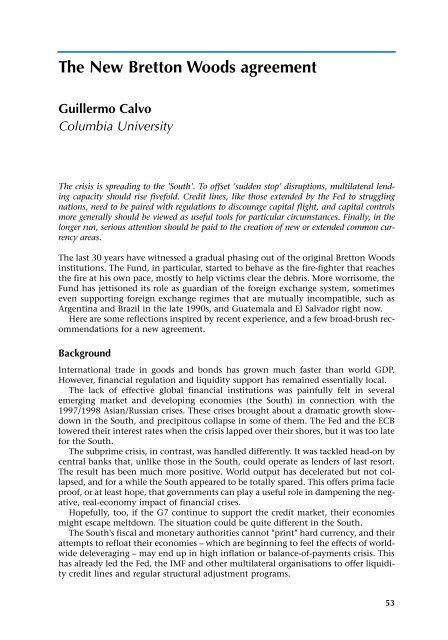What G20 Leaders Must Do To Stabilise our Economy and Fix ... - Vox
What G20 Leaders Must Do To Stabilise our Economy and Fix ... - Vox
What G20 Leaders Must Do To Stabilise our Economy and Fix ... - Vox
Create successful ePaper yourself
Turn your PDF publications into a flip-book with our unique Google optimized e-Paper software.
The New Bretton Woods agreementGuillermo CalvoColumbia UniversityThe crisis is spreading to the 'South'. <strong>To</strong> offset 'sudden stop' disruptions, multilateral lendingcapacity should rise fivefold. Credit lines, like those extended by the Fed to strugglingnations, need to be paired with regulations to disc<strong>our</strong>age capital flight, <strong>and</strong> capital controlsmore generally should be viewed as useful tools for particular circumstances. Finally, in thelonger run, serious attention should be paid to the creation of new or extended common currencyareas.The last 30 years have witnessed a gradual phasing out of the original Bretton Woodsinstitutions. The Fund, in particular, started to behave as the fire-fighter that reachesthe fire at his own pace, mostly to help victims clear the debris. More worrisome, theFund has jettisoned its role as guardian of the foreign exchange system, sometimeseven supporting foreign exchange regimes that are mutually incompatible, such asArgentina <strong>and</strong> Brazil in the late 1990s, <strong>and</strong> Guatemala <strong>and</strong> El Salvador right now.Here are some reflections inspired by recent experience, <strong>and</strong> a few broad-brush recommendationsfor a new agreement.BackgroundInternational trade in goods <strong>and</strong> bonds has grown much faster than world GDP.However, financial regulation <strong>and</strong> liquidity support has remained essentially local.The lack of effective global financial institutions was painfully felt in severalemerging market <strong>and</strong> developing economies (the South) in connection with the1997/1998 Asian/Russian crises. These crises brought about a dramatic growth slowdownin the South, <strong>and</strong> precipitous collapse in some of them. The Fed <strong>and</strong> the ECBlowered their interest rates when the crisis lapped over their shores, but it was too latefor the South.The subprime crisis, in contrast, was h<strong>and</strong>led differently. It was tackled head-on bycentral banks that, unlike those in the South, could operate as lenders of last resort.The result has been much more positive. World output has decelerated but not collapsed,<strong>and</strong> for a while the South appeared to be totally spared. This offers prima facieproof, or at least hope, that governments can play a useful role in dampening the negative,real-economy impact of financial crises.Hopefully, too, if the G7 continue to support the credit market, their economiesmight escape meltdown. The situation could be quite different in the South.The South's fiscal <strong>and</strong> monetary authorities cannot "print" hard currency, <strong>and</strong> theirattempts to refloat their economies – which are beginning to feel the effects of worldwidedeleveraging – may end up in high inflation or balance-of-payments crisis. Thishas already led the Fed, the IMF <strong>and</strong> other multilateral organisations to offer liquiditycredit lines <strong>and</strong> regular structural adjustment programs.53














